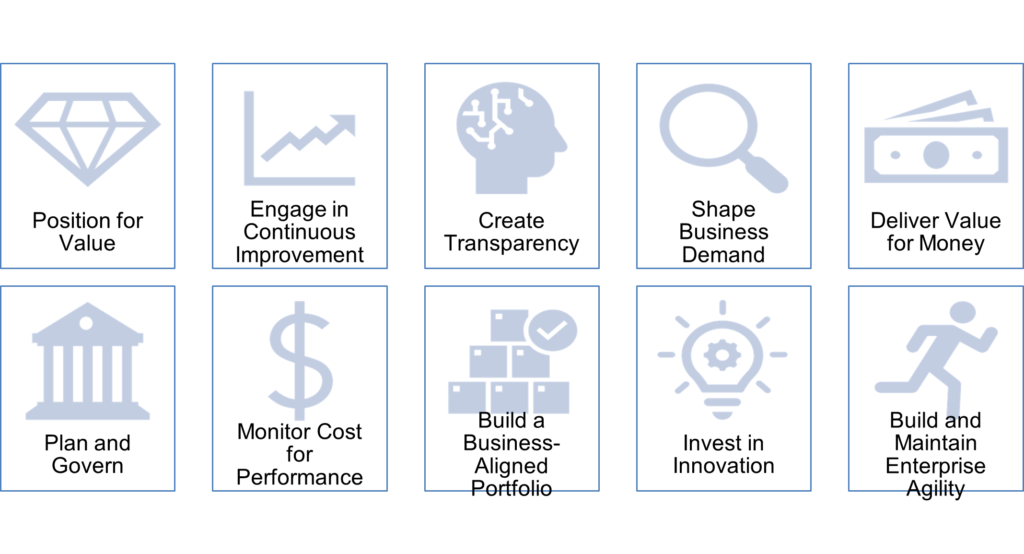Business Improvement and Change Within the TBM Framework

In an age of persistent disruption and change, one of the greatest enterprise challenges is assessing if and how a potential transition might benefit operations. For some business decisions, there seems to be little to no roadmap (for example, how does TinyML apply to your mission?). For others, however, the road is wonderfully well-mapped if you just know where to look.
Consider, for example, the multiple IT solutions that underscore daily operations, from maintenance to marketing. Suppose you suspect those operations could be improved or even changed with the right technological intervention but don’t know where to begin. In that case, a technology business management (TBM) framework is the place to start. TBM is designed to guide IT decision-making to support the overall strategy of your business and ensure that IT projects provide demonstrable business value.
Here’s how to map business improvement and change with a TBM framework.
Deploy Core TBM Tenets To Determine Best Practices
As articulated by the Technology Business Management Council, TBM is “a value management framework used by chief information officers (CIOs), chief technology officers (CTOs), chief financial officers (CFOs) and their teams for data-driven decision making about IT initiatives.”
This framework defines all the tools, processes, data, and people required to manage technology properly across an organization. Ten core TBM principles scaffold the guidance and best practices delivered by a TBM framework. We’ve shared them before, but it’s worth sharing the tenets again to understand how they might inform business improvement and change.
Figure 1. Ten Core TBM Principles
When a TBM framework is in place and these tenets are upheld, any decision that involves technology becomes more intentional, more transparent, and more measurable in its outcome. Applying the tenets of TBM to a desired organizational improvement or change ensures that technology will support the change, deliver quantifiable value, and drive business success in the long term.
Make Sure Your Business Systems Analysis Is Rooted in TBM
Business Analysis is a practice that helps facilitate change in an organization by identifying needs and determining potential solutions, ultimately improving the business’ value. Business systems analysis involves analyzing the IT needs of businesses and developing comprehensive solutions to the issues discovered. For many businesses, this approach requires IT expertise they don’t have and can’t afford to hire full-time.
Many businesses have difficulty differentiating between business analysis and business systems analysis, and the two terms are often used interchangeably. However, business analysis involves the detection of opportunities for improvement in your business at large. Solutions to these issues can include several avenues, from process improvements to new technology. Business analysis can also include tasks like managing stakeholder requirements and liaising between departments.
On the other hand, systems analysis involves using IT systems to achieve tactical goals and often poses solutions by designing new systems by configuring both old and new hardware and software. In short, systems analysis is the detail work involved in bringing about the results targeted by the business analysis process. Systems analysis that is rooted in the core tenets of TBM will focus on implementing meaningful solutions to your IT systems. These solutions will support the goals of all your business units, not just those within a single department. This approach reaps exponential benefits, including:
Improved Efficiency
Systems analysis can help your business streamline its processes by reducing redundancies and increasing automation. This streamlining helps improve efficiency, which boosts productivity for your employees, reduces time to market, and increases profits for your business.
Reduced Costs
Business systems analysis takes a hard look at your business processes, eliminating any redundancies and superfluous programs. System costs can decrease, while improved efficiencies cut down on labor and materials costs.
Increased Return on Investment (ROI)
Whether it’s a software system or a piece of hardware, every asset purchased for your business must provide some return on investment. Effective business analysis can determine the parts of a business process that add little to the organization’s value. By quantifying this lack of value, the process articulates the need for the business to change its processes to stakeholders and managers. Systems analysis ensures this by analyzing every aspect of your business systems and focusing on implementation activities that increase ROI. Programs that cost more they bring in may be eliminated as a result of a comprehensive systems analysis.
Collaboration for Change
Systems analysis emphasizes the strategic advantages of TBM, including the potential cost savings. It also increases collaboration with users at all levels of the organization and promotes access to usable data. IT can be a more powerful partner in business improvement and change.
Improving Your Business with a TBM Framework
When considering a new venture, it’s nice to have a map. A TBM framework functions as a map for IT decision-making to support new strategies, enterprise structures, and market goals.
TBM is just one in a library of practices, tools, and templates we at Momentum use to assist clients in their needs, including business improvement and change. Get in touch to learn more about how we might tap these tools to help steer your next venture.
 Tap to email
Tap to email

